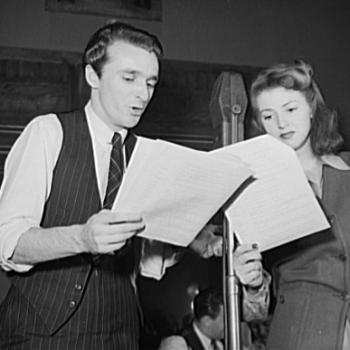I didn’t have to interview for graduate school. I did visit the campuses of my top choice schools, but it was very informal. The only graduate students and professors I met were the ones I had contacted in advance. I didn’t even meet the professor who became my adviser until after starting the program because she was out-of-town the weekend I visited.
Today the world of graduate education is very different. Most programs accept far fewer students than they did even ten years ago. At the same time, applicants have become increasingly impressive–from their GRE scores, to their writing samples, to even their recommendations.
In other words, acceptance to graduate school has become increasingly competitive. This helps explain why the interview (on-campus or skype) has become such an integral part of the graduate admission process.
First, because everyone looks fabulous on paper (or at least everyone who is invited to an interview), interviews help the graduate committee rank applicants. How well does a student discuss their academic goals and educational preparedness? Are they knowledgeable, convincing, and articulate? Does their research interest really fit with the program and faculty to which they have applied? Interviews even allow a glimpse of how candidates might eventually do on the job market, which is important for graduate faculty to think about considering the current state of the job market (see my last post).
Second, interviews help the graduate committee decide funding. Our program, probably like most others, only invites PhD candidates that we can fully fund for at least 4 years and MA students that we can provide at least full tuition. We usually are able to offer our top candidates extra incentives/funding, and the interview process helps us decide those offers.
Finally, on-campus interviews help involve current graduate students in the admission process. This is important for both prospective students and current students. Graduate student communities play a significant role in the retention and even academic success of students. It is important for prospective students to understand the type of community that could become part of their graduate education. It is also important for current students, as department-colleagues-in-training, to learn how to participate in interview weekends as they will one day follow a similar process when participating in faculty hires.
So now that you are completely stressed out about the importance of the graduate admission interview, let’s talk about how you can make a better impression.
- Relax. The interview suggests how students will perform in seminars and even (eventually) in the classroom. So you want the committee to evaluate your normal demeanor–not your so-stressed-out-that-you-can-barely-speak demeanor. Yes, I know you are stressed because everything seems to be riding on the interview. But the worst that could happen is that you don’t get into the program. That is hardly the end of the world. You can always apply again the next year, so, seriously, relax.
- Be able to talk specifically about your research interests. You would be surprised about how many students give only vague answers about the historical questions they want to explore, the sources they want to use, even the scholars who have inspired them. Remember, the interview committee wants to know how viable your project is and how well your research fits with their faculty and program. Even if you explained all the details in your admission essay, you still should be able to talk fluently and competently about your project. This is especially critical for PhD applicants. An application to a doctoral program assumes that the applicant has a fairly clear idea of a dissertation project and a basic grasp on relevant historiography. If you fail to articulate either of these points well during the interview, I can almost guarantee you a rejection.
- Know your audience. Do your homework before applying to graduate school and again before an interview. Yes, you probably applied to several schools. You may even have multiple interviews. But you still must be able to articulate what is attractive about each particular school. Program fit plays such a critical role in the success of graduate students that you can bet the interview committee is carefully assessing how well they think you might fit with their program. It is up to you to convince them that you will.
- When it comes to your answers, remember that quantity does not equal quality. This is a big one. You want to be competent, fluent, and thorough in your responses. You don’t want to talk so much that the committee has difficulty interjecting questions, or even has to cut you off to maintain the interview schedule. If you have the gift of gab, then make sure you can see your watch and make sure you force yourself to pause frequently. Kathryn Hume, in her very useful book Surviving Your Academic Job Hunt, urges applicants to practice regularly mock interview questions out loud. This will help calm your nerves before the interview. Also, as Hume writes, “if you practice endlessly aloud” you “can guarantee yourself the fluency you will need when under pressure” (23). Hume’s advice is for newly-minted PhDs on the job market; but it works just as well for applicants to graduate school.
It is exciting to receive interview invitations from graduate programs. But remember that this is still a stage in the admission process. Just like you made an investment in writing, revising, and rewriting your application, you will need to make an investment in preparing for the interview. Preparation may not make you perfect, but I guarantee it will make you better.
















